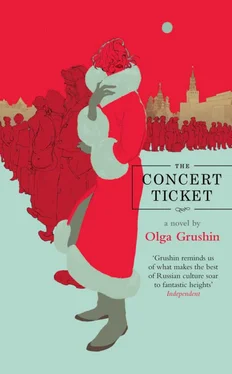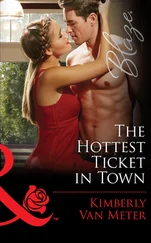“My turn,” he said harshly.
The hush crept on, for one instant, and two, and three. Then, abruptly baring his large, bright teeth, the man slapped Alexander on the back and passed him the knife and the bottle. “I see you’re worried about your better half missing the money,” he said, “so here’s what you do—spin her a tale that you were mugged, gets you loads of sympathy. Me and the boys had a bit too much fun the other day, but it worked like a charm, always does.”
Alexander’s throat, clenched only moments before, was swept open in a vast gulp of relief, and he spluttered at the shock of the scalding yet somehow smooth taste sliding downward, slicing through his innards as through butter. “My better half, yeah!” Laughing now, he wiped his mouth with his sleeve, just as the man had done, and laughed again, flushed with pleasure.
“Don’t hoard it, you must share with your fellow citizens,” said the man. “By the way, name’s Nikolai, no need to stand on ceremony here… So, where to now, my friend?”
Alexander took another deep gulp before handing over the bottle. His expansive feeling had returned. “Well, Nikolai,” he said, “there is this one place I happen to know—”
Two hours later they were sitting shoulder to shoulder on the steps leading down to the platforms, watching the trains below laboriously peel themselves off the tracks and edge out of the station—rickety, drafty little trains with broken windows, shuttling back and forth between the city and nearby provincial towns, disgorging from their jerking, smoky interiors drab streams of people, baskets, bags, dogs, buckets, cages, dust; and the other, rarer kind, whose softly lit windows stayed blank with drawn curtains the shade of warm cream, whose doors slid open soundlessly to allow in small knots of orderly passengers with bulky suitcases, whose carriages displayed neat little plaques with the names of their long-distance destinations.
Alexander was talking. He might have been talking for quite some time, because his throat ached; he was not sure. He was telling a story. He had taken an overnight train once, on a class excursion. “Back when I was still in school,” he added for clarity. The teacher had brought a whole roasted chicken, and they ate it cold, in the dark compartment; the light had burned out, but they liked it better that way. There was a full moon, and he pushed down the window and the moon ran along the train for hours, for hours, and the wind came gusting into his face, and it smelled of all sorts of strange, wonderful, wild things, like the sea and wet grass and great, mossy woods. One time they were passing this black plain, and he saw three or four pale horses running. He hadn’t known there were still horses out there. He sang too, everyone sang. The conductor came by with a clinking tray, and the glasses were set in these beautiful filigree holders, and they drank tea, snug in a hollow of some small hour after midnight. No one slept. In the morning, when they arrived, the city was much like this one—ugly new buildings on the outskirts, neglected old buildings in the center, fences and kiosks and ruined churches everywhere—but the train, the train had been different.
He had never told this to anyone, and it felt liberating and frightening at once to tell it now. To be honest, he was not certain he was speaking all that clearly, because some of his words, quite a few of his words perhaps, while flowing with perfect ease, even eloquence, in his mind, tended to stumble and fall into pits that kept opening with an alarming regularity in the middle of his sentences. But Nikolai listened, and nodded, and drank, and he drank too, and the trains kept pulling in and out of the station, their windows burning brighter and brighter as the night moved in, until the trains themselves became barely visible and the clatter of wheels seemed to rush ribbons of fiery squares out into the darkness, toward strange, secret destinations, toward unknown cities far, far away.
They sat in companionable silence for a long while. The snow had stopped falling. Alexander felt very warm inside. The crowds thinned, then grew dense, then began to thin again.
“This is good,” he said at last. “Right now I don’t even mind about all that time stuff.”
“What time stuff?”
“You know how, when you’re growing up, your father tells you life is short and you need to set your goals and work hard and all that drivel, or you’ll wake up one day and realize your time has run out or something?… Hey, give me that, my turn… Anyway, I used to believe him when I was, you know, young. As if time were some real thing you can lose or save or spill or break or put on a shelf. You must hoard it grain by grain, I remember he told me once.”
“Like sand in an hourglass,” Nikolai said, nodding thoughtfully. “An hourglass compartment of your soul. So to speak.”
Alexander stared at him.
“Kind of like that, yeah,” he said then, and tipped the bottle into his mouth.
“Your father’s wise.”
“No, he isn’t. He works in this pathetic little place with a bunch of losers. He doesn’t know anything. See, the way I figure it, life isn’t short. It’s long. Too long. I don’t want to save time, see, I want to kill it. I mean, look at all this useless time we have—days and hours and months and years and… and whatever comes after that… but nothing ever changes, no matter what we do with it, do you understand? Not here, anyway… I guess, though, it could be different in other places… It probably is, don’t you think?”
“Well, some things change.” Nikolai wrested the bottle away from him, held it up to the light, shook it roughly. “See, almost gone now.”
He guffawed, or else hiccuped.
Alexander did not take his eyes off the tracks. “I come here a lot,” he said sternly. “Just to watch. But one day I’ll save enough money, and board one of these trains, and go—go far away.” He touched the wallet, still in his pocket, then frowned into the night, which dipped and shimmered in thrilling but disorienting ways before his eyes.
“East or West?” Nikolai asked.
“What?”
“You want to go East or West?”
Alexander giggled at the joke. No one ever went West anymore, except for diplomats and other important persons on special State missions; the borders had been closed for decades. Of course, not that many people went East, either: one needed work permits, residency registration, relocation documents, security clearance… Or at least he thought that one did; he had seen the conductors study passengers’ papers before letting them board.
“Yeah, I used to think about it myself,” Nikolai said. “Hey, watch where you’re stepping, people sitting here!… Goes down smooth, doesn’t it? Mind if I…? The gold mines in the East, the forests, the lakes—they say the water out there is bright blue, so blue you wouldn’t believe it, and the trees so green, I dreamed of seeing it all when I was your age.”
“I’m color-blind,” Alexander announced.
Nikolai opened his mouth, threw his head back, and there was his Adam’s apple again, wobbling up and down while he laughed. Watching it move, Alexander was unexpectedly seized with a vague worry. An enormous clock was hovering over the platform, but the numbers glowed with an unpleasant neon haze, melting into one another, making it impossible to see what time it was. He supposed he was feeling a bit… yes, just a little bit…
“Color-blind? Isn’t that like a family disease or something? Your parents have it too?”
“No, they see colors fine. Mother’s tone-deaf, though, and—” He was going to say something witty, something witty about his family, but instead blurted out, “She wouldn’t want tickets to any concert, so that was all right, leaving the line like that… I mean, she wouldn’t want to go, anyway.”
Читать дальше












